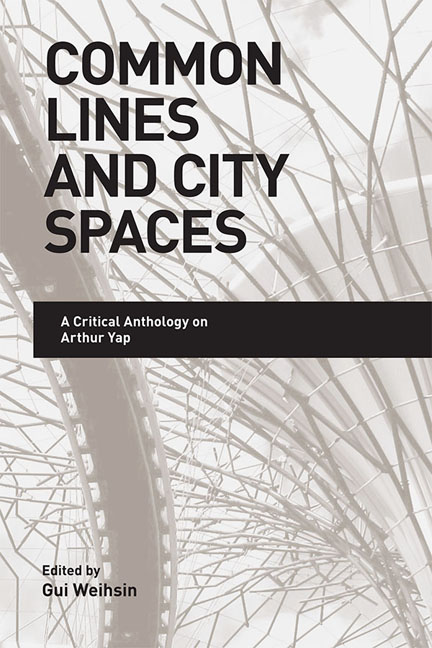Book contents
- Frontmatter
- Contents
- Acknowledgements
- About the Contributors
- 1 Common Lines and City Spaces: Introduction
- 2 The Transformation of Objects into Things in Arthur Yap's Poetry
- 3 “the same tableau, intrinsically still”: Arthur Yap, Poet-Painter
- 4 “go to bedok, you bodoh”: Arthur Yap's Mapping of Singaporean Space
- 5 On Places and Spaces: The Possibilities of Teaching Arthur Yap
- 6 Arthur Yap's Ecological Poetics of the Daily
- 7 “except for a word”: Arthur Yap's Unspoken Homoeroticism
- 8 “a long way from what?”: Folkways and Social Commentary in Arthur Yap's Short Stories
- Index
- Plate section
6 - Arthur Yap's Ecological Poetics of the Daily
Published online by Cambridge University Press: 19 May 2017
- Frontmatter
- Contents
- Acknowledgements
- About the Contributors
- 1 Common Lines and City Spaces: Introduction
- 2 The Transformation of Objects into Things in Arthur Yap's Poetry
- 3 “the same tableau, intrinsically still”: Arthur Yap, Poet-Painter
- 4 “go to bedok, you bodoh”: Arthur Yap's Mapping of Singaporean Space
- 5 On Places and Spaces: The Possibilities of Teaching Arthur Yap
- 6 Arthur Yap's Ecological Poetics of the Daily
- 7 “except for a word”: Arthur Yap's Unspoken Homoeroticism
- 8 “a long way from what?”: Folkways and Social Commentary in Arthur Yap's Short Stories
- Index
- Plate section
Summary
Arthur Yap's poems which portray the human condition and the environment through everyday scenes in public spaces demand an interpretation that radically challenges the anthropocentrism and nature-vs.-culture dualism of Western classical humanism. Nature is a prominent presence in some of Yap's poems, and conspicuously absent in others. Both its presence and absence are intertwined with the human sociocultural environment shaped by historical forces. Underlying this relationship is an ecological perspective that informs the subject matter and poetics of Yap's poetry, which can be considered “ecopoetry” to a certain extent. Although Yap's work shares ecopoetry's ecological awareness and concern with environmental issues, it refuses to be confined to any narrow definition of ecopoetry as “a new brand of nature poetry” (Bryson 2002, p. 3). This is the case partly because of its subversive postcolonial mimicry of Eurocentric perspectives on the human/nature relationship, and partly because of its central concern with daily urban life. While the characteristics of ecopoetry as described by American and British critics can shed some light on Yap's poems and poetics, they are inadequate for a fuller understanding of Yap's thematic concerns with the relationship between nature and culture, which are significantly different from those of the British and American nature poets whose work some critics consider early ecopoetry.
In his definition of “ecopoetry”, J. Scott Bryson traces “the history of nature poetry … back to the roots” of the English language, from Beowulf to Blake, to English Romantic poetry, and eventually to “a new form of nature poetry” produced by “antiromantics” such as Robert Frost, Robinson Jeffers, and Wallace Stevens, among others (2002, p. 2). Bryson's definition of “ecopoetry” draws on Robert Langbaum's discussion of a paradigm shift in twentieth-century poetry from traditional “nature poetry” largely as a result of scientific discoveries such as those in evolution and geology (p. 2). According to Langbaum, “the best twentieth-century nature poetry ‘defines itself precisely by opposing, or seeming to oppose, the pathetic fallacy …’ which characterizes overly romantic nature poetry” (quoted in Bryson 2002, pp. 2–3). In the poems of twentieth-century antiromantics, Langbaum maintains, one feels “in nature an unalterably alien, even an unfeeling, existence”, thus carrying “empathy several steps farther than did the nineteenth-century poets who felt in nature a life different from but compatible with ours” (quoted in Bryson, p. 3).
- Type
- Chapter
- Information
- Common Lines and City SpacesA Critical Anthology on Arthur Yap, pp. 114 - 132Publisher: ISEAS–Yusof Ishak InstitutePrint publication year: 2014

